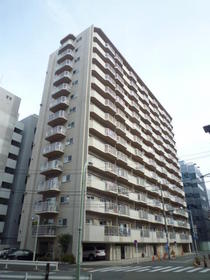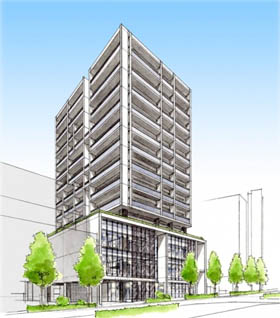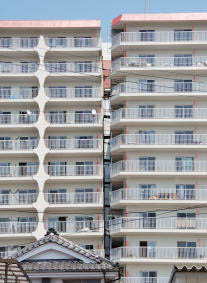Redevelopment difficulties for 'non-compliant' apartments

The Ministry of Land, Infrastructure, Transport and Tourism (MLIT) estimates that there are 5.9 million condominium apartments across Japan. One in four people in Tokyo live in a condominium, while approximately 20% of residents in Osaka and Kyoto live in one. Of these apartments, 1.06 million are in buildings that were built to the older earthquake codes (kyu-taishin). The current codes (shin-taishin) were introduced in 1981. Over the next 10 years, the number of apartments over 40 years old is expected to quadruple, creating an overwhelming number of ageing and deteriorating buildings. Yet, there have only been 180 cases of reconstruction to date.
One residential building currently facing an uncertain future is Toa Parkside Castle in Tokyo's Ota-ku. Located in a commercial district just two minutes from Omori Station, the 14 storey kyu-taishin building was completed in 1971, making it 42 years old. There are 94 apartments and a total floor area of 6,360 sqm.Read more
Developers to capitalize on aging apartments
Major real estate developers are expanding their apartment re-development business in anticipation of huge demand for reconstruction in the coming years. Both Nomura Real Estate and Tokyo Tatemono are currently converting low-rise old apartment blocks into large-scale developments that are built to the latest earthquake-codes and energy standards.Read more
What is the lifespan of an apartment in Japan?
It is a commonly held idea that homes in Japan only last 30 years before they deteriorate to a state where they have to be torn down. But how accurate is this statement, and what about the lifespan of apartment buildings?
"Japanese homes do not last as long as European or American ones"
Japanese residential properties are thought to have a lifespan of 30 years. In America that number is 55 years, and 77 years in England. Many apartment buyers hold the same belief and think that an apartment can only be held for 30 years. However, this assumption is incorrect.Read more
Asahi Kasei to rebuild two condominiums in Shibuya
 Asahi Kasei Fudousan Residence Corp will be rebuilding two small apartment buildings in Shibuya-ku.
Asahi Kasei Fudousan Residence Corp will be rebuilding two small apartment buildings in Shibuya-ku.
The first is "Udagawacho Jutaku" (3-3 Udagawacho) which is located alongside "Shibuya Koen Dori Avenue and next to the Shibuya Tobu Hotel. The street includes stores such as Parco, Gap and Opening Ceremony. The current 7-storey building has just 16 apartments and was completed in 1961. Approval from all apartment owners was obtained in September 2010 and demolition began last month.Read more
Proposed law to reduce minimum voting rights for reconstruction
The number of aging apartment buildings in Japan that need to be rebuilt in the near future is growing at a rapid pace, yet actual reconstruction projects are seriously lagging.
These projects are frequently stalled as the body-corporate meetings can take up to 10 years before any agreement is reached. This is due in part to the laws which require over 80% of apartment owners to agree to reconstruction. Older buildings tend to have older residents who are happy to stay where they are and don't want to relocate to temporary accommodation for 3 years while awaiting their new home. Other setbacks include a lack of funds for the project and owners with low incomes who cannot afford to take on any additional financial burdens.Read more
100 condominiums in Sendai City need rebuilding
 In Sendai City, a condominium that was seriously damaged by the March 11 Tohoku Earthquake is scheduled to be demolished. Sunny Heights Takasago is a 14-storey apartment building with 189 units. The earthquake damaged the foundations and the building began to lean at a dangerous angle, threatening neighboring buildings. Demolition is scheduled to begin by the end of December and should be completed within 6 months. This is the first case in Sendai City of an apartment building of this size being demolished due to the effects of the Tohoku earthquake, but it won't be the last.Read more
In Sendai City, a condominium that was seriously damaged by the March 11 Tohoku Earthquake is scheduled to be demolished. Sunny Heights Takasago is a 14-storey apartment building with 189 units. The earthquake damaged the foundations and the building began to lean at a dangerous angle, threatening neighboring buildings. Demolition is scheduled to begin by the end of December and should be completed within 6 months. This is the first case in Sendai City of an apartment building of this size being demolished due to the effects of the Tohoku earthquake, but it won't be the last.Read more
Reconstruction vs. long-life maintenance. What is the fate of your apartment?
The condominium market is facing a dilemma - to rebuild or to maintain.
The Japanese Government has enacted laws promoting both long-life construction methods and reconstruction. While there is the Basic Act for Housing and the Law on Promoting the Spread of Long-term Housing to ensure and improve stable housing and to promote the construction long-lasting buildings, there are also laws such as the Apartment Reconstruction Facilitation Law to enable and support building reconstruction.Read more
